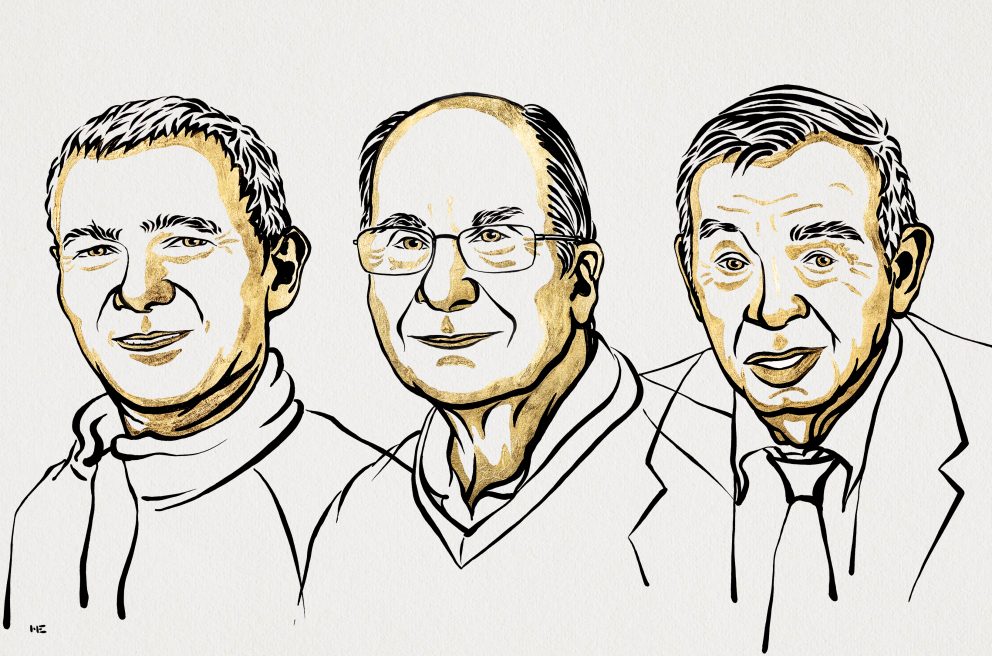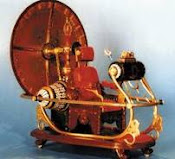 Prof.
Richard R. Ernst is a well known researcher in the field of Nuclear Magnetic
Resonance (NMR) Spectroscopy. Prof. Ernst Ernst was awarded the Nobel Prize in Chemistry in 1991
for his contributions towards the development of Fourier
Transform nuclear magnetic resonance (FT-NMR) spectroscopy and the
subsequent development of multi-dimensional NMR techniques. These underpin
applications of NMR both to chemistry (NMR spectroscopy) and to medicine (MRI). He also received Louisa Gross Horwitz Prize in 1991.
Prof.
Richard R. Ernst is a well known researcher in the field of Nuclear Magnetic
Resonance (NMR) Spectroscopy. Prof. Ernst Ernst was awarded the Nobel Prize in Chemistry in 1991
for his contributions towards the development of Fourier
Transform nuclear magnetic resonance (FT-NMR) spectroscopy and the
subsequent development of multi-dimensional NMR techniques. These underpin
applications of NMR both to chemistry (NMR spectroscopy) and to medicine (MRI). He also received Louisa Gross Horwitz Prize in 1991.
Prof. Ernst was born 1933 in Winterthur , Switzerland
Prof. Richard Ernst is
now 78 years old, but very hopeful and energetic and careful towards new
responsibilities. He has keen interest in Asian arts, music, and culture. He
enjoys interactions with young researchers and motivating them for doing
valuable work for the betterment of the society.
Recently Mr. Meher Wan, got opportunity to
interact with Prof. Richard R. Ernst on his life and research work. Here are
the excerpts of interaction.
First of all, I thank you
Professor for accepting my request for your. I feel that your thoughts will
motivate young minds to opt science as their career with social responsibility.
Meher Wan.
Your work was considered for Nobel in 1991. After receiving
Nobel Prize for Chemistry, How your life has been changed? What type of relax
or responsibility do you feel after this award?
Prof. Richard R. Ernst .My life changed very
little! You know that our shadow follows us irrespective of superficial
successes. I was always my biggest own hurdle to overcome. I had afterward even
less time to relax. But indeed, my responsibility grew. I feel obliged to say
what I think about our egomaniac course of doing business and structuring our
personal lifes. I try to teach as much as I can, being aware that after all it
will not help too much except for providing me better sleep.
MW. Let me
ask you about your days of childhood. How do you remember the childhood and
boyhood days of Richard? How did you perform in your schools? Where did you
study?
R. Ernst. I went to school in our city Winterthur
R. Ernst. I had two passions in my youth: chemistry and music. I
played the cello and I was composing music besides doing chemistry experiments.
But surely, I selected the proper profession!
MW. You
state in your autobiography for website of Swedish Academy, “I was rapidly
disappointed by the state of chemistry in the early fifties as it was taught.”
I think, this is the trend of schooling of science in many countries till now.
According to you what should be the mechanism of education for best
understanding of subject by a student?
R. Ernst. The best way of education is to evoke the curiosity of the
students and then let them discover nature and the world themselves. Classroom
teaching is absolutely useless, it just causes boredom.
MW. When
you started your Ph.D., what was in your mind? Did you want to serve the nation
or industry or somewhat else?
R. Ernst. I wanted to become a respectable person who contributes
something of value for mankind and gains respect in this way
MW. Which quality
of NMR spectroscopy impressed you, that you were motivated to invest your whole
life for this field of science?
R. Ernst. I was not primarily interested in NMR, but I was thrown
into NMR and I started to like it. This happens so often in life. We are not
born mathematicians or biologists. But our interests grow accidentally by
doing. And then you have to stay in a field until you have achieved something.
MW. Let us know the journey for making of Fourier
Transform NMR. What problems did you face for this work? Any interesting story
related to this instrumentation. I read somewhere; the research paper related
to this work was rejected two times.
R. Ernst. NMR suffered from very sensitivity and it was necessary to find a way to improve sensitivity. Parallel data acquisition was the solution. It led to Fourier transformation.
R. Ernst. NMR suffered from very sensitivity and it was necessary to find a way to improve sensitivity. Parallel data acquisition was the solution. It led to Fourier transformation.
MW. Which
scientific goal do you still want to achieve?
R. Ernst. In the moment I am working on pigment analysis in Central
Asian paintings in order to understand their origin and dating and for finding
means of conservation. NMR is useless for this purpose and I am using Raman
spectroscopy.
MW. What phenomenons
lead your group to think about 2D Fourier transform NMR spectroscopy?
R. Ernst. For determining molecular structures, one needs spatial
relations between nuclei. A two-dimensional map may contain this type of
information.
MW. Now
Multi-dimensional spectroscopy is in existence, what do you hope about future
of this field?
R. Ernst. I hope that it will find even more wide-spread application.
MW. Techniques developed
by you and your group have very wide applications now in different fields of
science, How do you feel about? Have you expected the wide range of application
of these, when you started the work on it?
R. Ernst. What could I ask
for more? There is nothing better in life than to experience the
"usefulness" of your "children"!
MW. In your valuable life which thing you
missed, and want to do?
R. Ernst. I hope to find more time to contemplate on the sense of our
lives. I hope earnestly to be less disturbed by obnoxious journalists!!!
MW. You have interest in culture and art of
different continents, how do the arts of Tibet
R. Ernst. I like in particular the colorfulness and the visuality
that allows an easy entrance across language barriers. It contains a wealth of
immortal truths.
MW. You often talk about
the responsibilities of researchers.
 R. Ernst. The responsibility is more with academic teachers than
with the researchers. anyway research is only a means of teaching and learning.
Academic teachers are the only ones who can express what they think without the
danger of losing the job, as politicians and merchants would. Thus they are
obliged to take advantage of their privileged position.
R. Ernst. The responsibility is more with academic teachers than
with the researchers. anyway research is only a means of teaching and learning.
Academic teachers are the only ones who can express what they think without the
danger of losing the job, as politicians and merchants would. Thus they are
obliged to take advantage of their privileged position.
MW. What do you want to
convey to the young minds who want to opt science as their career? and to
common public also.
R. Ernst. When ever you try to honestly evaluate the surroundings and
our responsibilities to improve them for the sake of future generations, you
are in the midst of scientific reasoning and it is not far of becoming a
professional scientist, researcher and in particular a responsible teacher.
I am very grateful to you that you invested your precious
time for us. I am studying your articles about science and society. Hoping for
next conversation on society, science and cultures very soon.
(This interview is published in 'Dream 2047' a bilingual magazine of Vigyan Prasar of DST, Govt of India, you can get it by clicking the link, you can read it in Hindi )












.jpeg)











